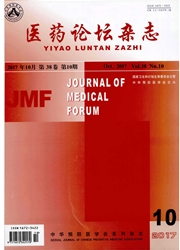

 中文摘要:
中文摘要:
目的研究热化疗对肺部肿瘤细胞生长影响的可能机制。方法参考临床常用剂量,采用43℃加热联合50μg/L紫杉醇(热化联合组)、单纯使用50μg/L紫杉醇(单纯化疗组)处理A549细胞,以未处理的A549细胞作对照,应用噻唑蓝比色法(MTT法)检测各处理方式下细胞增殖率,荧光法检测细胞内活性氧(ROS),按LDHKit要求检测LDH活力,SPSS 13.0对数据进行统计分析。结果热化联合组细胞增殖率(56.34±4.30)%低于对照组和单纯化疗组(P〈0.05);ROS在热化联合组增高(139.93±37.59)(P〈0.05),热化联合组D的LDH(3732.76±172.99)较对照组(68847.25±559.32)和单纯化疗组(14771.65±417.13)明显减少(P〈0.05)。结论热化疗联合应用可以明显抑制A549细胞的生长,这种抑制作用可能是通过诱导ROS的产生,损伤肺肿瘤细胞膜实现的。
 英文摘要:
英文摘要:
Objective To study the synergistic effect of thermotherapy in combination with chemotherapy on lung tumor cells to explore its underlying mechanisms. Methods A549 cells were subjected to different thermo-chemotherapy strategies: 43 ℃+Paclitaxel(50 μg/L,thermo-chemotherapy group) and Paclitaxel(50 μg/L) group;untreated cells were served as control.MTT assay was used to measure cell proliferation,fluorescence was used to check ROS and LDH checking was carried out. Results The proliferation rate of cells in the thermo-chemotherapy group(56.34±4.30)% was significantly lower than that in control group(100.00±0.00)%and chemotherapy group(78.77±2.38)%(P〈0.05).The expression of ROS in the cells of thermo-chemotherapy group(139.93±37.59) was higher than that in the others(P〈0.05),LDH in thermo-chemotherapy group(3732.76±172.99) was lower than that in control group(68847.25±559.32) and chemotherapy group(14771.65±417.13)(P〈0.05). Conclusions Thermotherapy can promote the inhibitory effect of Paclitaxel chemotherapy against the growth of lung tumor cell A549,probably through inducing ROS to injure cell membrane.
 同期刊论文项目
同期刊论文项目
 同项目期刊论文
同项目期刊论文
 期刊信息
期刊信息
